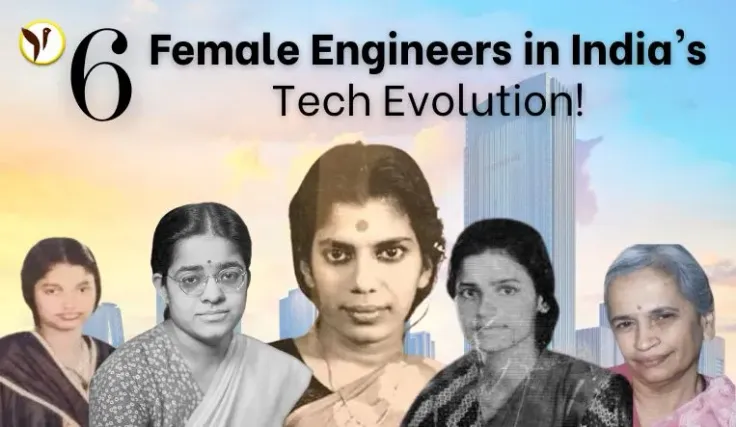India's technological future is not solely defined by the contributions of men. Women have also played a pivotal role in shaping the country's technological landscape and continue to do so. Thus, we will be discussing 6 women who are trailblazers in their respective fields, and their contributions have had a profound impact on the lives of millions. From constructing bridges to developing groundbreaking software, these women are breaking down barriers and inspiring others to pursue similar paths.
A Parvathi Mattancheril
Source: The Better India
Parvathi achieved a remarkable milestone by serving as the principal of three women's polytechnic colleges during her 34-year career. These include the Government Polytechnic for Women in Madurai, Dr Dharmambal Government Polytechnic College for Women in Madras, and the Government Polytechnic for Women in Coimbatore.
Hailing from Kerala, Parvathi had a natural curiosity for understanding how things worked. Opting for the engineering path was a predictable choice for someone with her interests. Her capabilities and innovative ideas opened doors for her. A well-known story recounts how, back in 1956, Parvathi was the sole female student on campus. The university had to hire a female typist just to provide her with some company.
Rajeshwari Chatterjee
Source: Wikipedia
Chatterjee made a significant impact on the fields of microwave and antennae engineering during her time at the Indian Institute of Sciences (IISc). Her innovative ideas and contributions revolutionized the field.
Inspired by her grandmother, Kamalamma Dasappa, a pioneer in women's education, Chatterjee pursued her passion for science. She studied Maths and Physics at Central College in Bengaluru and joined IISc in 1953, delving into the world of electron tube circuits and microwave technology.
Shakuntala A Bhagat
Source: Hindustan Times
Shakuntala Bhagat was the first Indian woman to obtain a civil engineering degree. She played a major role in shaping the architecture of India. Her passion for mechanics was evident in the projects she worked on with her husband, Anirudha S Bhagat.
In 1970, they established Quadricon, a bridge construction company specializing in patented prefabricated modular design. This innovative design was used to build a bridge in Spiti, Himachal Pradesh, in 1972.
By 1978, Quadricon had constructed 69 bridges across India, stretching from Kashmir to Arunachal Pradesh. Today, the company has built over 200 Quadricon steel bridges.
Ayyalasomayajula Lalitha
Source: News18
At the age of 18, Lalitha was left to care for her four-month-old daughter following the death of her husband. For no fault of her own, society prescribed her a sentence of isolation. But Lalitha did not let this define her life or her career choices.
As her daughter, Syamala Chenulu, tells The Better India, “When my father passed away, my mother had to suffer more than she should have. Her mother-in-law had lost her 16th child and took out that frustration on the young widow. It was a coping mechanism and today, I understand what she was going through. However, my mother decided not to succumb to societal pressures. She educated herself and earned a respectable job.”
When Lalitha chose the engineering path in 1940, she was the only female among hundreds of boys at the college. But she was soon joined by two other women, PK Thresia and Leelamma George Koshie, who also carved out incredible niches for themselves in the male-dominated profession.
PK Thresia
Source: The Better India
When Lalitha expressed her desire to pursue a four-year engineering degree at the College of Engineering, Guindy, University of Madras, her father, a professor at the college, wholeheartedly supported her decision.
However, Lalitha soon realized that gaining admission was the least of her obstacles. Women were not readily accepted in the field of engineering. To help his daughter feel more comfortable, her father placed an advertisement seeking other girls interested in the program. Two women responded to the call – P.K. Thresia and Leelamma George Koshie.
Subsequent to completing her degree, Thresia rose to prominence as the first woman chief engineer in the Public Works Department (PWD) in Kerala in 1971, a position she held for eight years. During her tenure, she oversaw the construction of 35 new bridges annually, along with various road projects.
Leelamma George Koshie
Source: India today
Koshie was part of the pioneering trio, the first three women to pursue engineering at CEG. In an era where women in innovation were scarce, Koshie's ideas in the public works department turned heads.
The Maharani of Travancore, impressed, often encouraged women in the state to draw inspiration from Koshie. The Maharani even supported Koshie's further studies in town planning in England. After completing her education, Koshie returned to India and contributed to projects in Trivandrum.
These six extraordinary women have not only broken barriers in engineering but have also inspired generations to pursue STEM fields and shape India's technological future.
Join our Free Workshops!
Also read, Indian Tunnel Rescue: Ongoing Efforts to Reach 41 Trapped Individuals







